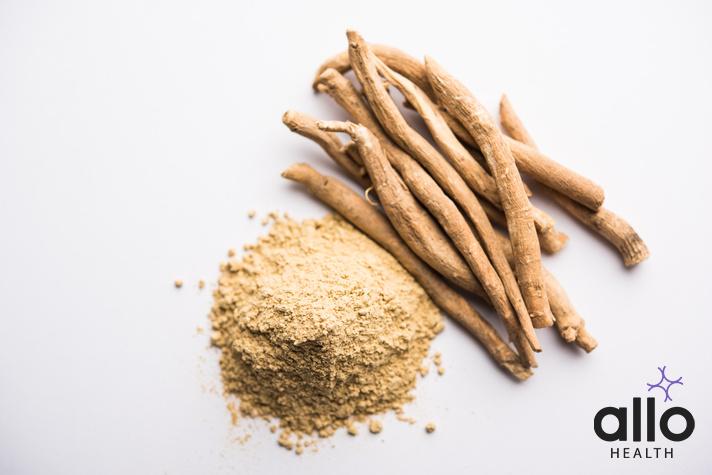Does Ashwagandha Increase GABA Levels?

Allo Health is dedicated to personalized well-being, offering support and trusted information tailored to individual health goals. The platform emphasizes human-generated content, led by a distinguished medical team of experts, including physicians and sexual health specialists. Their commitment to credibility involves rigorous fact-checking, authoritative research, and continuous updates to ensure accurate, up-to-date information. Allo Health's unique approach goes beyond conventional platforms, providing expert-led insights and a continuous commitment to excellence, with user feedback playing a crucial role in shaping the platform's authoritative voice.

Dr.Sushma.V completed MBBS degree from BGS GIMS,bangalore
Why This Was Upated?
Our experts continually monitor the health and wellness space, and we update our articles when new information became available.
Updated on 14 April, 2024
- Article was updated as part of our commitment to diversity, equity, and inclusion.

"The following blog article discusses alternative medicine practices and their potential effects or benefits. However, it is important to note that the information provided is for general educational purposes only and should not be considered as medical advice or a substitute for professional guidance from a qualified healthcare professional. Before considering any alternative medicine practices or treatments, it is recommended to consult with a healthcare professional.
Book consultation
Alternative medicine encompasses a wide range of practices that may not have undergone rigorous scientific evaluation or received widespread acceptance within the medical community. The effectiveness, safety, and appropriateness of alternative medicine practices can vary significantly depending on the individual, their specific medical conditions, and other factors.
It is important to approach alternative medicine practices with caution and skepticism. Some practices may carry potential risks or interact with existing medical treatments. A healthcare professional can provide guidance based on your medical history, evaluate the available evidence, and offer informed advice regarding the potential benefits and risks of alternative medicine practices.
Individuals with specific medical conditions, allergies, or taking medications should exercise particular caution when considering alternative medicine practices. Some practices may have contraindications or adverse effects, and it is essential to discuss these potential concerns with a healthcare professional before pursuing any alternative treatments."
As herbal dietary supplements, Ashwagandha holds a prominent place for its myriad health benefits. Among its many purported effects, one question frequently arises: does Ashwagandha increase GABA (Gamma-Aminobutyric Acid) levels? GABA is a neurotransmitter known for its calming effects on the brain, playing a crucial role in reducing anxiety and promoting relaxation. In this article, we delve into the scientific evidence surrounding Ashwagandha’s impact on GABA levels and its implications for various aspects of health.
What is Ashwagandha?
- Ashwagandha, also known as Withania somnifera, is an medicinal plant with a rich history in traditional Indian medicine.
- It is revered for its adaptogenic properties, aiding the body in stress management and promoting homeostasis.
- The herb contains active compounds like withanolides and amino acids, contributing to its diverse range of health benefits.
- Studies suggest that Ashwagandha supplements may support energy levels, enhance cognitive function, and improve sleep quality.
- Its potential to modulate cortisol levels makes it valuable in stress reduction.
- Ashwagandha’s effects on blood sugar and testosterone levels are of interest in various health conditions.
- Research indicates its role in improving brain function and mental health, attributed to its neuroprotective and calming effects.
- Additionally, Ashwagandha may have hormonal effects and could aid in the management of anxiety and sleep disorders.
- With ongoing studies exploring its diverse benefits, Ashwagandha remains a cornerstone of herbal supplements and alternative treatments.
Sexual Benefits of Ashwagandha
- Improve Libido: Ashwagandha has been traditionally used as an aphrodisiac in Ayurvedic medicine for thousands of years, with studies suggesting its potential to enhance sexual desire and arousal.
- Enhance Sexual Performance: Regular supplementation with Ashwagandha may lead to improved sexual performance, including increased endurance and stamina, which can positively impact sexual satisfaction.
- Ashwagandha on Stress: By modulating cortisol levels, Ashwagandha helps alleviate stress and anxiety, which are common inhibitors of sexual desire and performance. Reduced stress can lead to a more relaxed state conducive to sexual activity.
- Hormonal Balance: Ashwagandha’s adaptogenic properties support hormonal balance, including testosterone levels in men and estrogen levels in women, which are crucial for healthy sexual function.
- Increase Fertility: Studies have shown that Ashwagandha supplementation may improve sperm quality and motility in men, while also supporting reproductive health in women, thus enhancing fertility potential.
- Management of Sexual Dysfunction: Ashwagandha’s ability to improve blood flow and reduce oxidative stress may contribute to its efficacy in managing sexual dysfunction, including erectile dysfunction and arousal difficulties.
- Enhance Mood and Confidence: By promoting overall well-being and confidence, Ashwagandha can indirectly enhance sexual experiences, leading to greater satisfaction and intimacy in relationships.
What is GABA Level and It’s Importance?
Gamma-aminobutyric acid (GABA) is a neurotransmitter in the brain that acts as a natural calming agent. Its levels indicate the balance between excitation and inhibition in the nervous system, crucial for maintaining mental health and overall well-being. Here’s why GABA levels are important:
- Anxiety Regulation: GABA inhibits excessive neuronal activity, reducing anxiety symptoms and promoting relaxation, making it essential for managing anxiety disorders.
- Sleep Quality: Adequate GABA levels are necessary for promoting restful sleep by calming the brain and inducing sleepiness.
- Stress Response: GABA helps modulate the body’s response to stress by counteracting the effects of cortisol, the stress hormone, thus promoting resilience to ongoing stressors.
- Neuroprotection: GABA’s neuroprotective effects shield nerve cells from damage, potentially reducing the risk of neurodegenerative diseases and enhancing overall brain health.
- Mood Regulation: GABA plays a role in mood stability and may contribute to the management of mood disorders such as depression and bipolar disorder.
Maintaining optimal GABA levels is essential for mental and physical health, influencing aspects ranging from anxiety levels to sleep quality and overall resilience to stress.
Role of GABA in Sexual Health

- Anxiety Reduction: GABA, known for its calming effects, helps alleviate anxiety, which can significantly impact sexual function and desire. High-stress levels can lead to decreased libido and sexual performance, making GABA modulation crucial for maintaining sexual health.
- Enhanced Mood: GABA promotes a sense of well-being and relaxation, fostering a positive mood conducive to sexual activity. By reducing stress and anxiety, GABA indirectly supports sexual arousal and satisfaction.
- Regulation of Hormones: GABA influences the release of hormones involved in sexual function, such as testosterone and estrogen. Optimal GABA levels contribute to hormonal balance, which is essential for libido, sexual desire, and overall sexual health.
- Improved Sleep Quality: GABA’s role in promoting restful sleep indirectly benefits sexual health. Adequate sleep is essential for maintaining optimal hormone levels, including those related to sexual function.
- Reduction of Performance Anxiety: GABA’s anxiolytic effects can help alleviate performance anxiety, a common issue affecting sexual performance. By promoting relaxation and reducing nervousness, GABA can enhance sexual confidence and enjoyment.
GABA plays a multifaceted role in sexual health by reducing anxiety, promoting relaxation, regulating hormones, improving sleep quality, and reducing performance anxiety. Optimizing GABA levels through lifestyle modifications or supplements may positively impact sexual function and overall well-being.
Does Ashwagandha Increase GABA Levels?

While Ashwagandha’s impact on GABA levels primarily relates to its anxiolytic and calming effects, there is some evidence suggesting potential benefits for sexual health indirectly through stress reduction:
- Stress Reduction: Ashwagandha’s ability to modulate cortisol levels and mitigate the effects of ongoing stress may indirectly improve sexual health. High stress levels can contribute to sexual dysfunction, including decreased libido and erectile dysfunction.
- Hormonal Effects: Ashwagandha supplementation has been associated with increased testosterone levels in some studies, which can positively influence libido and sexual function in both men and women.
- Anxiety Management: By reducing anxiety levels, Ashwagandha may alleviate performance anxiety and promote relaxation, potentially enhancing sexual experiences.
- Overall Well-being: Ashwagandha’s adaptogenic properties and neuroprotective effects contribute to overall health and vitality, which can have a positive impact on sexual health.
- Clinical Relevance: While more research specific to sexual health is needed, Ashwagandha’s role in managing stress, hormonal balance, and overall well-being suggests potential benefits for sexual health.
While Ashwagandha’s direct effects on sexual health through GABA modulation are not well-established, its ability to reduce stress, balance hormones, and promote overall well-being may indirectly contribute to improved sexual function and satisfaction.
Scientific Studies and Evidence
Several scientific studies have explored the link between Ashwagandha and GABA levels, shedding light on its potential mechanisms and effects:
Laboratory Studies:
- Laboratory experiments have indicated that Ashwagandha extracts can increase GABA receptor activity in the brain, suggesting a potential mechanism for its anxiolytic effects.
Animal Studies:
- Animal models have shown that Ashwagandha supplementation leads to an increase in GABA levels in the brain, comparable to the effects of anti-anxiety medications.
Human Trials:
- Human clinical trials have demonstrated promising results, with participants experiencing a decrease in anxiety levels and improved sleep quality following Ashwagandha intake.
- One study observed that Ashwagandha supplementation led to significant reductions in cortisol levels, a hormone linked to stress and memory performance, suggesting a potential modulation of the stress response through GABAergic pathways.
Neurological Effects:
- Ashwagandha’s modulation of GABA levels may contribute to its neuroprotective effects, potentially mitigating damage to neurons caused by oxidative stress and chemical treatments.
Overall, while more research is needed to fully understand the mechanisms underlying Ashwagandha’s effects on GABA levels, existing evidence suggests a promising link between the two, with implications for mental health and stress management.
Risks and Considerations
- Hormonal Effects: Ashwagandha’s impact on hormone levels, including testosterone, may influence sexual function and libido, but individual responses vary.
- Interaction with Medications: Ashwagandha supplements may interact with medications for blood pressure or anxiety, potentially affecting sexual wellness.
- Potential Side Effects: While generally considered safe, Ashwagandha may cause mild side effects such as gastrointestinal discomfort or skin rash, impacting sexual well-being.
- Lack of Standardization: The potency of Ashwagandha supplements can vary between brands and formulations, affecting effectiveness for sexual health.
- Consultation Recommended: Before using Ashwagandha for sexual wellness, individuals with health conditions or those taking medications should consult a healthcare provider to assess potential risks and benefits.
- Dosage Considerations: Optimal dosages for sexual wellness outcomes are not well-established, requiring careful monitoring of Ashwagandha intake.
- Potential Allergic Reactions: Individuals with allergies to plants in the Solanaceae family, which includes Ashwagandha, should exercise caution to avoid adverse reactions affecting sexual wellness.
Conclusion
While more research is warranted, the existing evidence suggests a potential link between Ashwagandha supplementation and increased GABAergic activity in the brain. This may contribute to the herb’s observed benefits in reducing anxiety, improving sleep quality, and enhancing overall well-being. Incorporating Ashwagandha supplements into one’s routine may offer a natural approach to supporting mental health and combating the effects of stress. As always, consulting with a healthcare professional is recommended before beginning any new supplement regimen.
Most Asked Questions
-
How does Ashwagandha affect GABA levels in the body?
Ashwagandha may help increase GABA levels in the brain, promoting relaxation and reducing anxiety. Scientific studies suggest that certain compounds in Ashwagandha could enhance GABA receptor activity, contributing to its calming effects.
-
Can Ashwagandha supplements improve sleep quality?
Yes, Ashwagandha supplements have been associated with improved sleep quality in some studies. By potentially increasing GABAergic activity, Ashwagandha may help promote restful sleep and alleviate insomnia symptoms.
-
Is Ashwagandha safe to use for managing anxiety?
Ashwagandha is generally considered safe for most people when used as directed. Clinical studies have shown promising results in reducing anxiety levels with Ashwagandha supplementation. However, it’s important to consult with a healthcare professional before starting any new supplement regimen, especially if you have underlying health conditions or are taking medications.
-
Are there any side effects associated with Ashwagandha intake?
While Ashwagandha is well-tolerated by most individuals, some may experience mild side effects such as digestive issues or drowsiness. It’s essential to follow recommended dosage guidelines and monitor your body’s response. If you experience any adverse reactions, discontinue use and consult with a healthcare provider.






































